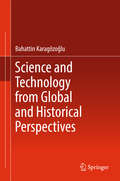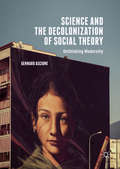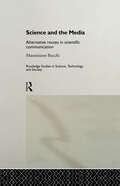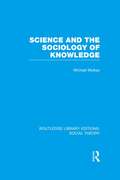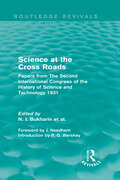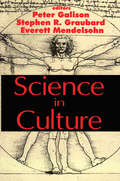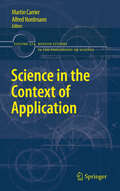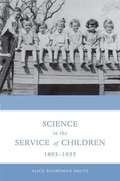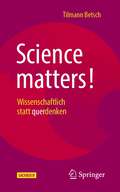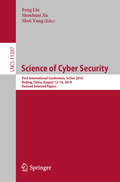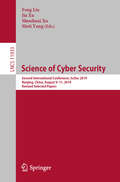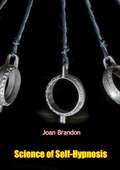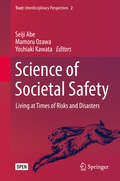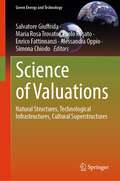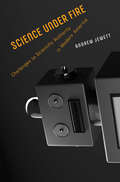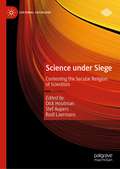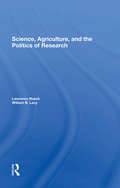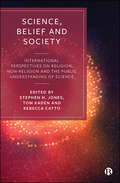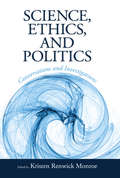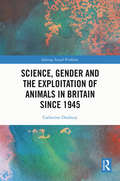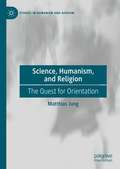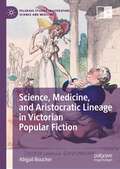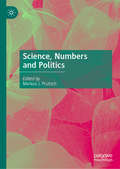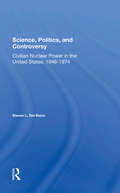- Table View
- List View
Science and Technology from Global and Historical Perspectives
by Bahattin KaragözoğluThis book provides science and technology ethos to a literate person. It starts with a rather detailed treatment of basic concepts in human values, educational status and domains of education, development of science and technology and their contributions to the welfare of society. It describes ways and means of scientific progresses and technological advancements with their historical perspectives including scientific viewpoints of contributing scientists and technologists. The technical, social, and cultural dimensions are surveyed in relation to acquisition and application of science, and advantages and hindrances of technological developments. Science and Technology is currently taught as a college course in many universities with the intention to introduce topics from a global historical perspective so that the reader shall stretch his/her vision by mapping the past to the future. The book can also serve as a primary reference for such courses.
Science and the Decolonization of Social Theory
by Gennaro AscioneThis book addresses the ideological figure of modernity, its presumed historical significance as an era, and its theoretical adequacy as a frame. It shows how science is evoked to prevent the sociological imagination from elaborating non-Eurocentric categories and terminologies that are more adequate for a global age. The idea of modernity should not only be contested, but radically unthought in its foundational assumptions. These assumptions inform concepts such as secularization, emancipation, the 'global' and accumulation of capital. This book frees these concepts from ethnocentrism and discloses a path toward a new, non-Eurocentric, global social theory. Gennaro Ascione explores the transformative potential of decolonizing knowledge through a radical reconsideration of the historical and epistemological role that the intellectual reference to science plays in the construction of concepts. This ground-breaking work challenges social theorists to think globally beyond modernity, bringing together social theory and science in an unprecedented way. Importantly, it makes accessible a new space of missing theorization for further developments and inquiries in the field.
Science and the Media: Alternative Routes to Scientific Communications (Routledge Studies in Science, Technology and Society)
by Massimiano BucchiIn the days of global warming and BSE, science is increasingly a public issue. This book provides a theoretical framework which allows us to understand why and how scientists address the general public. The author develops the argument that turning to the public is not simply a response to inaccurate reporting by journalists or to public curiosity, nor a wish to gain recognition and additional funding. Rather, it is a tactic to which the scientific community are pushed by certain "internal" crisis situations. Bucchi examines three cases of scientists turning to the public: the cold fusion case, the COBE/Big Bang issue and Louis Pasteur's public demonstration of the anthrax vaccine, a historical case of "public science." Finally, Bucchi presents his unique model of communications between science and the public, carried out through the media. This is a thoughtful and wide-ranging treatment of complex contemporary issues, touching upon the history and sociology of science, communication and media studies. Bucchi's theories on scientific communication in the media are a valuable contribution to the current debate on this subject.
Science and the Sociology of Knowledge (Routledge Library Editions: Social Theory #Vol. 8)
by Michael MulkayHow far is scientific knowledge a product of social life? In addressing this question, the major contributors to the sociology of knowledge have agreed that the conclusions of science are dependent on social action only in a very special and limited sense. In Science and the Sociology of Knowledge Michael Mulkay's first aim is to identify the philosophical assumptions which have led to this view of science as special; and to present a systematic critique of the standard philosophical account of science, showing that there are no valid epistemological grounds for excluding scientific knowledge from the scope of sociological analysis. The rest of the book is devoted to developing a preliminary interpretation of the social creation of scientific knowledge. The processes of knowledge-creation are delineated through a close examination of recent case studies of scientific developments. Dr Mulkay argues that knowledge is produced by means of negotiation, the outcome of which depends on the participants' use of social as well as technical resources. The analysis also shows how cultural resources are taken over from the broader social milieu and incorporated into the body of certified knowledge; and how, in the political context of society at large, scientists' technical as well as social claims are conditioned and affected by their social position.
Science at the Cross Roads: Papers from The Second International Congress of the History of Science and Technology 1931 (Routledge Revivals)
by N. I. Bukharin et alThe papers given by the Soviet Delegation to the Second International Congress of the History of Science and Technology in London in 1931, headed by N. I. Bukharin, exerted a profound influence on Western historiography of science. Perhaps the most influential contribution was that of Hessen, who made a long and classical statement of Marxist historiography, taking Isaac Newton as his example. The collection, which appeared in Britain at the height of the Depression, fostered an acute social awareness and a heated debate among many working scientists. Accredited by some as "the starting point of a new evaluation of the history of science", the book reflects the huge social and economic divide between Socialism and Capitalism present at the time of publication, and its influence on intellectual culture and scientific advancement.
Science in Culture: His Legacy In Science, Art, And Modern Culture
by Peter Galison Stephen R. Graubard Everett MendelsohnTwenty-five years ago, Gerald Holton's Thematic Origins of Scientific Thought introduced a wide audience to his ideas. Holton argued that from ancient times to the modern period, an astonishing feature of innovative scientific work was its ability to hold, simultaneously, deep and opposite commitments of the most fundamental sort. Over the course of Holton's career, he embraced both the humanities and the sciences. Given this background, it is fitting that the explorations assembled in this volume reflect both individually and collectively Holton's dual roots. In the opening essay, Holton sums up his long engagement with Einstein and his thematic commitment to unity. The next two essays address this concern. In historicized form, Lorraine Daston returns the question of the scientific imagination to the Enlightenment period when both sciences and art feared imagination. Daston argues that the split whereby imagination was valued in the arts and loathed in the sciences is a nineteenth-century divide. James Ackerman on Leonardo da Vinci meshes perfectly with Daston's account, showing a form of imaginative intervention where it is irrelevant to draw analogies between art and science. Historians of religion Wendy Doniger and Gregory Spinner pursue the imagination into the bedroom with literary-theological representations. Science, culture, and the imagination also intersect with biologist Edward Wilson and physicist Steven Weinberg. Both tackle the big question of the unity of knowledge and worldviews from a scientific perspective while art historian Ernst Gombrich does the same from the perspective of art history. To emphasize the nitty-gritty of scientific practice, chemists Bretislav Fredrich and Dudley Herschback provide a remarkable historical tour at the boundary of chemistry and physics. In the concluding essay, historian of education Patricia Albjerg Graham addresses pedagogy head-on. In these various reflections on science, art, literature, philosophy, and education, this volume gives us a view in common: a deep and abiding respect for Gerald Holton's contribution to our understanding of science in culture. Peter Galison is Mallinckrodt Professor of History of Science and of physics at Harvard University. Stephen R. Graubard is editor of the American Academy of Arts and Sciences and its journal, Daedalus, and professor of history emeritus at Brown University. Everett Mendelsohn is director of the History of Science Program at Harvard University.
Science in History: Death in Beijing
by Daniel AsenIn this innovative and engaging history of homicide investigation in Republican Beijing, Daniel Asen explores the transformation of ideas about death in China in the first half of the twentieth century. In this period, those who died violently or under suspicious circumstances constituted a particularly important population of the dead, subject to new claims by police, legal and medical professionals, and a newspaper industry intent on covering urban fatality in sensational detail. Asen examines the process through which imperial China's old tradition of forensic science came to serve the needs of a changing state and society under these dramatically new circumstances. This is a story of the unexpected outcomes and contingencies of modernity, presenting new perspectives on China's transition from empire to modern nation state, competing visions of science and expertise, and the ways in which the meanings of death and dead bodies changed amid China's modern transformation.
Science in the Context of Application
by Martin Carrier Alfred NordmannWe increasingly view the world around us as a product of science and technology. Accordingly, we have begun to appreciate that science does not take its problems only from nature and then produces technological applications, but that the very problems of scientific research themselves are generated by science and technology. Simultaneously, problems like global warming, the toxicology of nanoparticles, or the use of renewable energies are constituted by many factors that interact with great complexity. Science in the context of application is challenged to gain new understanding and control of such complexity--it cannot seek shelter in the ivory tower or simply pursue its internal quest for understanding and gradual improvement of grand theories. Science in the Context of Application will identify, explore and assess these changes. Part I considers the "Changing Conditions of Scientific Research" and part II "Science, Values, and Society". Examples are drawn from pharmaceutical research, the information sciences, simulation modelling, nanotechnology, cancer research, the effects of commercialization, and many other fields. The book assembles papers from well-known European and American Science Studies scholars like Bernadette Bensaude-Vincent, Janet Kourany, Michael Mahoney, Margaret Morrison, Hans-Jörg Rheinberger, Arie Rip, Dan Sarewitz, Peter Weingart, and others. The individual chapters are written to address anyone who is concerned about the role of contemporary science in society, including scientists, philosophers, and policy makers.
Science in the Service of Children, 1893-1935
by Alice Boardman Smuts Robert W. Smuts R. Malcolm Smuts Barbara B. Smuts P. Lindsay Chase-LansdaleThis book is the first comprehensive history of the development of child study during the early part of the twentieth century. Most nineteenth-century scientists deemed children unsuitable subjects for study, and parents were hostile to the idea. But by 1935, the study of the child was a thriving scientific and professional field. Here, Alice Boardman Smuts shows how interrelated movements-social and scientific-combined to transform the study of the child. Drawing on nationwide archives and extensive interviews with child study pioneers, Smuts recounts the role of social reformers, philanthropists, and progressive scientists who established new institutions with new ways of studying children. Part history of science and part social history, this book describes a fascinating era when the normal child was studied for the first time, a child guidance movement emerged, and the newly created federal Children's Bureau conducted pathbreaking sociological studies of children.
Science matters!: Wissenschaftlich statt querdenken
by Tilmann BetschWas ist eigentlich Wissenschaft? Diese Frage wird angesichts globaler Herausforderungen wie COVID-19, dem Klimawandel u.a. zunehmend neu diskutiert – und wir erleben eine beängstigende Zunahme des Widerstandes gegen die wissenschaftlichen Methoden aufseiten sogenannter Querdenker, Verschwörungstheoretiker und Faktenleugner. Doch viele kritisieren die Wissenschaft, ohne den Kern wissenschaftlichen Denkens und Arbeitens verstanden zu haben! Prof. Dr. Tilmann Betsch tritt diesem Trend mit seinem Buch entschlossen entgegen und hält ein leidenschaftliches Plädoyer, warum Wissenschaft unverzichtbar ist: Anhand anschaulicher Beispiele und Anekdoten beschreibt er die Bestandteile des wissenschaftlichen Werkzeugkastens – jedes Kapitel klärt dabei ein gängiges Vorurteil gegenüber der Wissenschaft auf und zeigt, mit welchen Methoden Erkenntnisse in der Forschung wirklich gewonnen werden.Dieses Buch gibt Ihnen Hilfestellung, Ihr kritisches Denken zu schärfen und Unfug schlagfertig entgegenzutreten. Es richtet sich damit nicht nur an Studierende der Wissenschaften, sondern an alle Interessierten, die „alternative Fakten“ nicht mehr hören können und für Diskussionen um die Bedeutung der Wissenschaft gewappnet sein wollen.
Science of Cyber Security: First International Conference, SciSec 2018, Beijing, China, August 12-14, 2018, Revised Selected Papers (Lecture Notes in Computer Science #11287)
by Feng Liu Moti Yung Shouhuai XuThis book constitutes the proceedings of the First International Conference on Science of Cyber Security, SciSec 2018, held in Beijing, China, in August 2018.The 11 full papers and 6 short papers presented in this volume were carefully reviewed and selected from 54 submissions. The papers focus on science of security; cybersecurity dynamics; attacks and defenses; network security; security metrics and measurements; and performance enhancements.
Science of Cyber Security: Second International Conference, SciSec 2019, Nanjing, China, August 9–11, 2019, Revised Selected Papers (Lecture Notes in Computer Science #11933)
by Feng Liu Moti Yung Shouhuai Xu Jia XuThis book constitutes the proceedings of the Second International Conference on Science of Cyber Security, SciSec 2019, held in Nanjing, China, in August 2019. The 20 full papers and 8 short papers presented in this volume were carefully reviewed and selected from 62 submissions. These papers cover the following subjects: Artificial Intelligence for Cybersecurity, Machine Learning for Cybersecurity, and Mechanisms for Solving Actual Cybersecurity Problems (e.g., Blockchain, Attack and Defense; Encryptions with Cybersecurity Applications).
Science of Self-Hypnosis
by Joan BrandonSELF HYPNOSIS is a natural endowment which may be developed for much good.Many of us take advantage of this power on numerous occasions without really realizing what we are doing.In the following chapters I shall endeavor to explain how these powers may be developed and how they may benefit you.YOU MAY WONDER, “Am I the self-hypnotic type? “Can I develop this control over my mind and body?”Yes, YOU CAN HYPNOTIZE YOURSELF. So long as you have the ability to concentrate, you can put to work latent energy, awaken new physical and mental powers that you never thought existed—but is takes practice and more practice!So, let’s begin NOW!
Science of Societal Safety: Living At Times Of Risks And Disasters (Trust Ser. #2)
by Seiji Abe Mamoru Ozawa Yoshiaki KawataThis open access book covers comprehensive but fundamental principles and concepts of disaster and accident prevention and mitigation, countermeasures, and recovery from disasters or accidents including treatment and care of the victims. Safety and security problems in our society involve not only engineering but also social, legal, economic, cultural, and psychological issues. The enhancement needed for societal safety includes comprehensive activities of all aspects from precaution to recovery, not only of people but also of governments. In this context, the authors, members of the Faculty of Societal Safety Science, Kansai University, conducted many discussions and concluded that the major strategy is consistent independently of the type and magnitude of disaster or accident, being also the principle of the foundation of our faculty.The topics treated in this book are rather widely distributed but are well organized sequentially to provide a clear understanding of the principles of societal safety. In the first part the fundamental concepts of safety are discussed. The second part deals with risks in the societal and natural environment. Then follows, in the third part, a description of the quantitative estimation of risk and its assessment and management. The fourth part is devoted to disaster prevention, mitigation, and recovery systems. The final, fifth part presents a future perspective of societal safety science.Thorough reading of this introductory volume of societal safety science provides a clear image of the issues. This is largely because the Japanese have suffered often from natural disasters and not only have gained much valuable information about disasters but also have accumulated a store of experience. We are still in the process of reconstruction from the Great East Japan earthquake and the Fukushima nuclear power plant accident. This book is especially valuable therefore in studying the safety and security of people and their societies.
Science of Valuations: Natural Structures, Technological Infrastructures, Cultural Superstructures (Green Energy and Technology)
by Alessandra Oppio Enrico Fattinnanzi Paolo Rosato Simona Chiodo Salvatore Giuffrida Maria Rosa TrovatoThis volume collects the best papers presented at the 2019 Conference SIEV (Italian Society of Appraisal and Valuation) on the Science of Evaluation foundations, actuality, and prospects. The book consists of twenty-six papers and is organized into four parts: the first one collects reflections on the nature of the value judgement, on the truth of the evaluative statement, and on the authenticity its contents, the values; the next three present operational experiences in the three fields of natural, urban and cultural heritage where the knowledge of the value of the human space, supports decisions and policies, highlighting feature concerning: value and valuations in the dialectic between earth and the city; the value bearers between heuristic and normatively; the role of valuation for the complementarity of rules and creativity. The book is being published in the midst of the new radical transformations of the equilibrium between social system and environment generated by the serious and unexpected crises of the third decade of this century. Reflections on the reality that fills evaluative statement with truth – the reality of values – is more topical than ever in a historic phase in which the role of democracies and the destiny of civil coexistence is called into question, claiming the order of unamendable values like truth, justice and beauty. The book brings together experiences that focus on the “intentional evaluative consciousness” as a condition for the responsibility of the subject - individual and collective - concerning the saliences and urgencies most significantly contributing to the formation of orderly communities.
Science under Fire: Challenges to Scientific Authority in Modern America
by Andrew JewettAmericans have long been suspicious of experts and elites. This new history explains why so many have believed that science has the power to corrupt American culture. Americans today are often skeptical of scientific authority. Many conservatives dismiss climate change and Darwinism as liberal fictions, arguing that “tenured radicals” have coopted the sciences and other disciplines. Some progressives, especially in the universities, worry that science’s celebration of objectivity and neutrality masks its attachment to Eurocentric and patriarchal values. As we grapple with the implications of climate change and revolutions in fields from biotechnology to robotics to computing, it is crucial to understand how scientific authority functions—and where it has run up against political and cultural barriers. Science under Fire reconstructs a century of battles over the cultural implications of science in the United States. Andrew Jewett reveals a persistent current of criticism which maintains that scientists have injected faulty social philosophies into the nation’s bloodstream under the cover of neutrality. This charge of corruption has taken many forms and appeared among critics with a wide range of social, political, and theological views, but common to all is the argument that an ideologically compromised science has produced an array of social ills. Jewett shows that this suspicion of science has been a major force in American politics and culture by tracking its development, varied expressions, and potent consequences since the 1920s. Looking at today’s battles over science, Jewett argues that citizens and leaders must steer a course between, on the one hand, the naïve image of science as a pristine, value-neutral form of knowledge, and, on the other, the assumption that scientists’ claims are merely ideologies masquerading as truths.
Science under Siege: Contesting the Secular Religion of Scientism (Cultural Sociology)
by Dick Houtman Stef Aupers Rudi LaermansIdentifying scientism as religion’s secular counterpart, this collection studies contemporary contestations of the authority of science. These controversies suggest that what we are witnessing today is not an increase in the authority of science at the cost of religion, but a dual decline in the authorities of religion and science alike. This entails an erosion of the legitimacy of universally binding truth claims, be they religiously or scientifically informed. Approaching the issue from a cultural-sociological perspective and building on theories from the sociology of religion, the volume unearths the cultural mechanisms that account for the headwind faced by contemporary science. The empirical contributions highlight how the field of academic science has lost much of its former authority vis-à-vis competing social realms; how political and religious worldviews define particular research findings as favorites while dismissing others; and how much of today’s distrust of science is directed against scientific institutions and academic scientists rather than against science per se.
Science, Agriculture, And The Politics Of Research
by Lawrence M Busch William B LacyMany friends, colleagues, and research staff members have directly and indirectly contributed to this book. It is impossible to acknowledge the contribution of each. Still, we would like to recognize several persons as well as institutions that have been particularly helpful. Research funds were provided by the Kentucky Agricultural Experiment Station and by the Ford Foundation. John Myers of the Current Research Information System provided us with a computer tape listing current projects. Carolyn Sachs was extremely helpful in coordinating the mail survey of scientists. Christian Ritter, Lisa Slatin, and Bobbie Sparks assisted in coding the data. Ann Stockham developed the index and also organized the data. Janet Baynham, Sue Lewis, and Greg Taylor aided in the voluminous computer programming and statistical analysis. Rosemary Cheek typed most of the manuscript. Marlene Pettit, Michael Claycomb, Deborah Wheeler, and Penny Hogue also assisted in the typing. Janice Taylor aided in the manuscript typing and ran interference on much of the administrative detail.
Science, Belief and Society: International Perspectives on Religion, Non-Religion and the Public Understanding of Science
by Stephen H. Jones, Tom Kaden and Rebecca CattoThe relationship between science and belief has been a prominent subject of public debate for many years, one that has relevance to everything from science communication, health and education to immigration and national values. Yet, sociological analysis of these subjects remains surprisingly scarce. This wide-ranging book critically reviews the ways in which religious and non-religious belief systems interact with scientific theories and practices. Contributors explore how, for some secularists, ‘science’ forms an important part of social identity. Others examine how many contemporary religious movements justify their beliefs by making a claim upon science. Moving beyond the traditional focus on the United States, the book shows how debates about science and belief are firmly embedded in political conflict, class, community and culture.
Science, Ethics, and Politics: Conversations and Investigations
by Kristen Renwick MonroeThe relationship between science and ethics has been subject to much debate. This volume demonstrates the mutually beneficial relationship that can take place between ethics and science. It presents work that utilises the tools of science - broadly conceptualised - to elucidate ethical issues, showing that careful scientific analysis of ethical issues can reveal new insights. This is supplemented by conversations with the authors - some of them pre-eminent scientists addressing issues of ethics, including two Nobel laureates - to learn how they came to the study of ethics and ask how they conceptualise and think about ethical issues. Science, Ethics and Politics provides substantive insight into particular ethical issues, ranging from issues of torture during war to parents' obligations to children. This book is designed as a complement to traditional texts on ethics and should appeal to students of ethics as well as to the general public.
Science, Gender and the Exploitation of Animals in Britain Since 1945 (Solving Social Problems)
by Catherine DuxburyThis book offers an historical analysis of the culture of animal-dependent science in Britain from 1945 to the present, exploring key areas of animal experimentation such as warfare, medical science and law from a gendered perspective. Questioning the nature of knowledge production in this area, and how animal experimentation intersects with broader cultural norms and values concerning sex, and gender, it examines the impact of contemporary forms of capitalism on animal dependent science, its historical trajectory and gendered configuration. With close attention to the broad social context from the creation of the Welfare State and the loss of Empire, to the emergence of neoliberalism in the 1980s and its present day omnipotent manifestation, the author asks how animal experimentation and the use of nonhuman animals in specific areas of science is gendered and has implications for women. Drawing on a variety of sociological, philosophical, feminist and historical theories and engaging with a wealth of primary and secondary materials of scientific research of the time, Science, Gender and the Exploitation of Animals in Britain Since 1945 contends that there is a persistent, gendered ideology of animal use which remains inscribed within the policies of the British neoliberal state. As such, it will appeal to scholars of sociology, history and philosophy with interests in gender and the treatment of nonhuman animals.
Science, Humanism, and Religion: The Quest for Orientation (Studies in Humanism and Atheism)
by Matthias JungIn the human quest for orientation vis-à-vis personal life and comprehensive reality the worldviews of religionists and humanists offer different answers, and science also plays a crucial role. Yet it is the ordinary, embodied experience of meaningful engagement with reality in which all these cultural activities are rooted. Human beings have to relate themselves to the entirety of their lives to achieve orientation. This relation involves a non-methodical, meaningful experience that exhibits the crucial features for understanding worldviews: it comprises cognition, volition, and emotion, is embodied, action-oriented, and expressive. From this starting-point, religious and secular worldviews articulate what is experienced as ultimately meaningful. Yet the plurality and one-sidedness of these life stances necessitates critical engagement for which philosophy provides indispensable means. In the end, some worldviews can be ruled out, but we are still left with a plurality of genuine options for orientation.
Science, Medicine, and Aristocratic Lineage in Victorian Popular Fiction (Palgrave Studies in Literature, Science and Medicine)
by Abigail BoucherScience, Medicine, and Lineage in Popular Fiction of the Long Nineteenth Century explores the dialogue between popular literature and medical and scientific discourse in terms of how they represent the highly visible an pathologized British aristocratic body. This books explores and complicates the two major portrayals of aristocrats in nineteenth-century literature: that of the medicalised, frail, debauched, and diseased aristocrat, and that of the heroic, active, beautiful ‘noble’, both of which are frequent and resonant in popular fiction of the long nineteenth century. Abigail Boucher argues that the concept of class in the long nineteenth century implicitly includes notions of blood, lineage, and bodily ‘correctness’, and that ‘class’ was therefore frequently portrayed as an empirical, scientific, and medical certainty. Due to their elevated and highly visual social positions, both historical and fictional aristocrats were frequently pathologized in the public mind and watched for signs of physical excellence or deviance. Using popular fiction, Boucher establishes patterns across decades, genres, and demographics and considers how these patterns react to, normalise, or feed into the advent of new scientific and medical understandings.
Science, Numbers and Politics
by Markus J. PrutschThis study explores the dynamic relationship between science, numbers and politics. What can scientific evidence realistically do in and for politics? The volume contributes to that debate by focusing on the role of “numbers” as a means by which knowledge is expressed and through which that knowledge can be transferred into the political realm. Based on the assumption that numbers are constantly being actively created, translated, and used, and that they need to be interpreted in their respective and particular contexts, it examines how numbers and quantifications are made ‘politically workable’, examining their production, their transition into the sphere of politics and their eventual use therein. Key questions that are addressed include: In what ways does scientific evidence affect political decision-making in the contemporary world? How and why did quantification come to play such an important role within democratic politics? What kind of work do scientific evidence and numbers do politically?
Science, Politics, And Controversy: Civilian Nuclear Power In The United States, 1946-1974 (Special Studies In Science, Technology, And Public Policy)
by Stephen L Del SestoAs of June 1977, the United States had some 232 nuclear power plants either planned or in operation, with a generating capacity estimated at about 321 million kilowatts. To date, the industrial world has spent over $200 billion in order to produce useful energy from nuclear fission. By all odds, civilian nuclear power is one of the largest technological ventures in history. To many, this massive effort is completely justified: No other single technology offers as much promise for satisfying world energy needs in the years ahead—particularly as fossil fuels dwindle and climb drastically in price. Yet to others, there is no single technology which raises such serious questions of risk to public health and safety.
